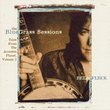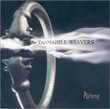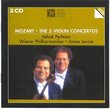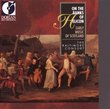| All Artists: Libby Crabtree Title: Mendelssohn - Elijah / Terfel, Fleming, Bardon, Ainsley, Fulgoni, Paul Daniel Members Wishing: 0 Total Copies: 0 Label: Decca Release Date: 10/14/1997 Genre: Classical Style: Opera & Classical Vocal Number of Discs: 2 SwapaCD Credits: 2 UPC: 028945568829 |
Search - Libby Crabtree :: Mendelssohn - Elijah / Terfel, Fleming, Bardon, Ainsley, Fulgoni, Paul Daniel
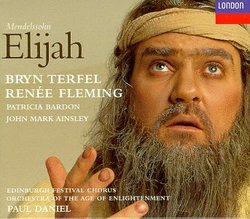 | Libby Crabtree Mendelssohn - Elijah / Terfel, Fleming, Bardon, Ainsley, Fulgoni, Paul Daniel Genre: Classical
No Description Available. Genre: Classical Music Media Format: Compact Disk Rating: Release Date: 14-OCT-1997 |
Larger Image |
CD DetailsSynopsis
Product Description No Description Available. Genre: Classical Music Media Format: Compact Disk Rating: Release Date: 14-OCT-1997 Similarly Requested CDs
|
CD ReviewsA Dramatically Intense, Moving "Elijah" A. | New York City, USA | 06/27/2000 (4 out of 5 stars) "Even if it is flawed, this is the kind of recording that reminds you why, exactly, Mendelssohn is in the Pantheon of great composers. To start, Bryn Terfel and Renee Fleming turn out some of the most sensitive, smart, deeply-felt singing I've heard in a long time. Fleming's Widow is palpably tearful -- sorrowfully when proclaiming that there's "no breath left" in her young son, then joyfully as he "reviveth." And her reading of "Hear Ye, Israel," is truly involved, and not simply sung as a bravura aria -- there's no doubt that God is present, powerful and "he that comforteth, ... will strengthen thee."The passion, conviction and tenderness of Elijah comes out in brilliant relief as Terfel negotiates the virtuoso music of Part 1. Mendelssohn makes some serious dramatic and vocal demands: Elijah must be strong and tender as he heals the Widow's son; cruel and righteous as he confronts Ahab and the people of Israel to destroy the myth of Baal; gentle as he calls upon the lord to "shew these people that Thou art Lord God"; and, finally, after his prayers are answered, triumphant in the aria "Is Not His Word Like a Fire?" What's most astonishing is not only does Terfel deliver, but that he makes the drama so real -- he engages the music and the text head-on and, in so doing, engages the listener. This is what musical drama is all about.Contralto Patricia Bardon and tenor John Mark Ainsley produce good performances, but don't pack the punch of Terfel or Fleming -- Ainsley's Obediah in Part 1 ("If with all your hearts ...") is a little strained at the top, and Bardon's "Oh Rest in the Lord" is a little too thickly nasal to seem truly angelic or comforting. The greatest disappointment was Libby Crabtree's singing in the duet "Lord, Bow Thine Ear to Our Prayer," and in other small ensemble settings (the Trio "Lift Thine Eyes to the Mountains" and double quartet "For He shall give His Angels charge over thee," among others). Her tinnyness and exaggeration of diphthongs cuts harshly against Fleming's mellifluous singing, enough to be a real distraction. Still, it's not nearly enough to seriously hurt this fine recording. It's very clear that Conductor Paul Daniel had a strong vision for the work, and his understanding of its great depth and passion is evident immediately in the overture. The brass are used to their full effect as punctuation marks, leading us, moment by tense moment, to the glorious ocean's-wave ebb and flow of the strings rising and falling in scales, *finally*, to the choral climax "Help, Lord!" What's truly impressive is that Daniel sustains this pitch through to the joyful end, making this an "Elijah" that laveth the thirsty ear.(Coda: By the way, whether or not the work is in the original key, it hardly matters -- this is a performance of real substance -- a keeper.)" This is a fantastic recording of a awesome work! BrianAKabat@avenew.com | The Chicago area | 02/20/1999 (5 out of 5 stars) "Bryn Terfel gives a magnificent performance on this recording! His musicianship and sensitivity to things like phrasing, expression, sense of dynamics etc. is spine-tingling! I have heard many people sing this role (including Thomas Hampson and Thomas Allen, who also give great performances), but I think he is the best I have heard yet! Rene Fleming's performance is also-as always-very good. The tempos and overall interpretation by Daniel are very musical." The Standard. Period. Andrew Webb | Meridian, MS United States | 04/25/2002 (5 out of 5 stars) "I've heard many fine performances of this, the Mendelssohn masterpiece, both live and recorded, and THIS recording is the quintessential presentation. I've heard this sung in German, and I've heard it sung in English. And, no matter which of the two this is sung in, there is no finer performance anywhere. From the opening, with Bryn Terfel bursting force with the most power I've heard from him to date, to the defeat of the prophets of Baal, to the plea for Israel, to the final praise of God by the children of Israel, this work never lets up. Regardless of the pitching of the instruments or how Mendelssohn would have heard it, there is no doubt in my mind that he most certainly would have been enthralled with Terfel's performance. Terfel is, no question, the best there is in the world of classical bass-baritones today. Renee Fleming delivers a magnificently gorgeous performance. John Mark Ainsley holds his own as well. I was particularly impressed with the work of Patricia Bardon, whom I'd never heard from before this recording. Paul Daniel is worth his salt, too. And, the cake, which all of the soloists and the conductor are the icing for, is the combination of the Edinburgh Festival Chorus and the Enlightenment Orchestra...these are simply wonderful! They are so dramatic, articulate, and involved. If one is in search of a recording of "ELIJAH" by which one wants to hear the way it was meant to be performed (with intensity, emotion, fervor, and energy), then THIS is THE recording to pursue."
|

 Track Listings (22) - Disc #1
Track Listings (22) - Disc #1